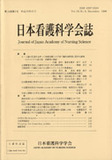Japanese
English
- 販売していません
- Abstract 文献概要
- 参考文献 Reference
要約
小児用HLC尺度を小学4年から中学3年までの健常児と小児慢性疾患児に適用した.その結果,内的統制と他者統制においては,小学4年から6年までは慢性疾患児と健常児とに差異はなかった.一方,内的統制では中学1年から3年では慢性疾患児が健常児より低い得点であった.他者統制では慢性疾患児が中学3年で健常児より高い得点であった.
この健常児と慢性疾患児の差異,特に中学1年から3年までの差異から,慢性疾患児は病気体験によって内的統制を低下させていることが示唆された.
小児慢性疾患児に関わる医療関係者は,小児慢性疾患児の健康に関連する意思決定における依存傾向や自律性の阻害を認識する必要があろう.
Abstract
The Children's Health Locus of Control Scale was administered to healthy children and children with a chronic physical illness in the 4th-6th grade of primary school and the 1st-3rd grade of junior high school (aged 10 to 15 years).
By regression analysis, it was found that children with a chronic physical illness in 4th-6th grade of primary school had same internal and external scores as their healthy counterparts.
On the other hand, children with a chronic physical illness in 1st-3rd grade of junior high school had lower internal scores than healthy children in same grade. Children with a chronic physical illness in 3rd grade of junior high school had lower external scores than healthy children in same grade.
The difference among children with and without chronic physical illness,especially between children in the 1st-3rd grades of junior high school, suggested that learning occurs from the experiences related to illness and results in decreased internals.
Health care professionals should be aware that for children with chronic illnesses tend to rely heavily on providers, perhaps to the detriment of their ability to learn effective skills for independent health-related decision making.
Copyright © 1998, Japan Academy of Nursing Science. All rights reserved.


